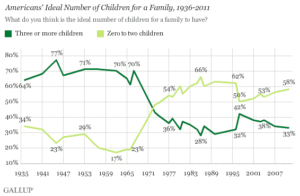“Having children is one of the most destructive things you can to do the environment, say researchers.”
“Want to fight climate change? Have fewer children.”
There are a lot of stupid things that have been written in the modern age. That said—and I mean this very sincerely—I don’t think anything tops these headlines from The Guardian and The Independent (among others). In each of these articles, the researchers and authors suggest we limit our procreative efforts to two or less children and thereby save the earth.
The science tells us, they say, that more children will produce more carbon dioxide. And ipso facto we destroy the planet. Regardless of whether you have zero, one, or a boatload of kids, here are three reasons we all should question these statements.
1. A world without youngest siblings. It’s easy to wax eloquent about limiting population growth and curbing big families. But, let’s play out our world where parents adhere to this prescription. Albert Einstein’s dad was the fifth of six kids. Harriett Tubman was the fifth of nine kids. Mark Zuckerberg is the third-oldest of four kids. Mother Theresa was the last of three siblings. If we want to mandate a world of one or two-children families, we mandate a world where the Alberts, Harrietts, Marks, and Theresas don’t exist. What we’re limiting in this environmental utopia isn’t carbon emissions—but creative, inspiring, and industrious human beings. It’s our belief our future’s problems will be best solved our future’s young leaders.
2. We know where this leads. It’s no secret what the future looks like if we follow this advice: Consider Japan, a country with very few large families and a country also facing a looming population crisis. In Japan, the number of babies is far outpaced by the number of deaths. And, the United States is on a similar path. As communities experience increased wealth and education, adults produce fewer children. Again, in a vacuum, “fight climate change by having less” might make empirical sense. Played out over generations? This devastating perspective spells a future where the world’s wealthiest and most-educated societies face the crippling consequences of short-sighted arguments about population growth. A society that purchases more adult diapers than baby diapers. Ironically, in an article also published by The Guardian, we’re warned, “Across Europe birth rates are tumbling. The net effect is a ‘perfect demographic storm’ that will imperil economic growth across the continent.”
3. It reduces freedom. Finally, a worldview espousing population control assumes adults are unable to make decisions for their families about the number of children they ought to have. There is wisdom in equipping moms and dads to lead their families well. There is merit in helping them navigate family decisions in ways that are sustainable for them. But we believe it is in our world’s best interests to increase the freedoms for moms and dads, not limit it (or shame them if their decisions differ from our preferences).
###
Postscript: We’ve interviewed a number of dads with big families who are creating a lot of future world changers. You can meet a few of them here: Robert, Andy, and Mike.
Looking for dadcraft delivered straight to your inbox? Subscribe to our bi-weekly newsletter.
Photo by Christian Langballe on Unsplash.
